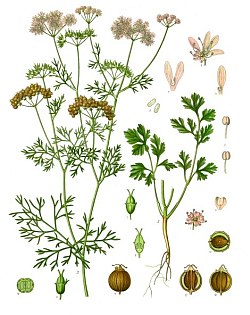History of Coriander: Name Origin
(Coriandrum sativum, Linn.)

Coriander History: Early Uses & Folklore.
The history of coriander crosses several continents and a number of centuries.
Hippocrates, the Ancient Greek physician, recommended the use of coriander as a medicine.
Pliny mentioned that the highest quality coriander to be found in Italy was that which was grown in Egypt. Coriander seeds appear to have been quite prized by the Egyptians as they have been found in tombs of the 21st dynasty.
Late Bronze Age invaders introduced coriander into Britain. The invaders used coriander to flavor their barley gruel. The British mixed coriander with cumin and vinegar and used to preserve meat.
Farmers in the Essex, England region refer to coriander by the name of Col.
Thought to be an aphrodisiac, coriander was added to love potions during the medieval and Renaissance periods. Robert Turner would appear to agree with this assessment and said that when consumed with wine, coriander “stimulates the animal passions.”
The Israelites used coriander in their cooking. The Book of Numbers compares coriander with manna.
And, the Chinese believe that those who consume coriander seeds will be rewarded with immortality.
Gerard described coriander as a “very stinking herb” but did discuss the merits of the dried seed.
The history of coriander moves to South America when the Spanish conquistadors introduced the flavorful herb to Mexico and Peru. Once there, coriander quickly became an integral ingredient in their chili and other dishes.
History of Coriander: Medicinal Uses
It was the unpleasant smell of coriander that led to its use as a medicine. The ancients believed that anything with such a strong and unpleasant odor must surely possess powerful curative and/or preventive attributes.
The British Pharmacopoeia of medicines discusses coriander but it is now mainly used to disguise the taste of unpleasant medicines. Coriander water was once used to ease flatulence and ‘windy colic’. It was also used in ointments for the relief of rheumatism and arthritis.
Coriander seeds can have a narcotic effect when consumed in quantity which is perhaps how it became to be known as ‘dizzycorn’.
Additional Coriander Information.
Our Herb Garden also has guides on Growing Coriander and Coriander Companion Planting.